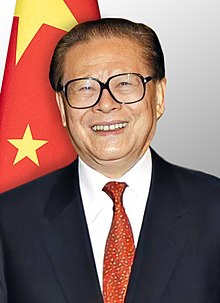

General Secretary of the Communist Party of China
17 August 1926 Yangzhou, Jiangsu, Republic of China
-
24 June 1989 – 15 November 2002
Former General Secretary of the Communist Party of China (1989–2002) In this Chinese name, the family name is Jiang (江). This biography of a living person needs additional citations for verification. Please help by adding reliable sources. Contentious material about living persons that is unsourced or poorly sourced must be removed immediately, especially if potentially libelous or harmful. Find sources: "Jiang Zemin" – news · newspapers · books · scholar · JSTOR (July 2019 ) (Learn how and when to remove this template message) Jiang Zemin江泽民 Jiang in 2002General Secretary of the Communist Party of ChinaIn office 24 June 1989 – 15 November 2002Preceded by Zhao ZiyangSucceeded by Hu JintaoPresident of the People's Republic of ChinaIn office 27 March 1993 – 15 March 2003PremierLi Peng Zhu RongjiVice President Rong Yiren Hu JintaoPreceded by Yang ShangkunSucceeded by Hu JintaoChair of the Central Military CommissionIn office State Commission: 19 March 1990 – 8 March 2005 Party Commission: 9 November 1989 – 19 September 2004Deputy List Cao Gangchuan (2002–05) Guo Boxiong (2002–05) Hu Jintao (1999–2004) Chi Haotian (1995–2003) Zhang Wannian (1995–2003) Liu Huaqing (1989–98) Zhang Zhen (1992–98) Yang Shangkun (1989–93) Preceded by Deng XiaopingSucceeded by Hu Jintao Personal detailsBorn (1926-08-17 ) 17 August 1926 (age 95) Yangzhou, Jiangsu, Republic of ChinaNationalityChinesePolitical partyCommunist Party of ChinaSpouse(s)Wang Yeping (m. 1949)ChildrenJiang Mianheng Jiang MiankangMotherWu Yueqing (吴月清 ) (1897–1977)FatherJiang Shijun (江世俊 ) (1895–1973)Alma materNational Central University (transferred) National Chiao Tung University (BS) ProfessionElectrical engineerSignature Central institution membership 1989–2002: 13th, 14th, 15th Politburo Standing Committee 1989–2005: 13th, 14th, 15th, 16th Central Military Commission 1987–2002: 13th, 14th, 15th Politburo 1983–2002: 12th, 13th, 14th, 15th Central Committee 1988–2008: 7th, 8th, 9th, 10th, 11th National People's Congress Other political offices held 1987–89: Party Committee Secretary, Shanghai 1984–87: Mayor, Shanghai 1983–85: Minister, Ministry of Electronic Industries Paramount Leader of the People's Republic of China ← Deng Xiaoping Hu Jintao → Jiang Zemin"Jiang Zemin" in Simplified (top) and Traditional (bottom) Chinese charactersSimplified Chinese江泽民 Traditional Chinese江澤民 TranscriptionsStandard MandarinHanyu PinyinJiāng Zémín Wade–GilesChiang1 Tzê2-min2 IPA Yue: CantoneseYale RomanizationGōng Jaahk-màahn JyutpingGong1 Zaak6-maan4 IPA Southern MinHokkien POJKang Tik-bîn Jiang Zemin (/dʒ iː ˈ ɑː ŋ z ə ˈ m ɪ n / ; Chinese: 江泽民 ; pinyin: Jiāng Zémín ; born 17 August 1926) is a Chinese retired politician who served as General Secretary of the Communist Party from 1989 to 2002, as Chairman of the Central Military Commission of the Communist Party of China from 1989 to 2004, and as President of the People's Republic of China from 1993 to 2003. Jiang represented the "core of the third generation" of Communist Party of China (CPC) leaders since 1989. Jiang came to power unexpectedly as a compromise candidate following the Tiananmen Square protests of 1989, when he replaced Zhao Ziyang as General Secretary after Zhao was ousted for his support for the student movement. As the involvement of the "Eight Elders" in Chinese politics steadily declined, Jiang consolidated his hold on power to become the "paramount leader" in the country during the 1990s. Urged by Deng Xiaoping's Southern Tour in 1992 to accelerate "opening up and reform", Jiang officially introduced the term "socialist market economy" in his speech during the 14th National Congress held later that year, ending a period of ideological uncertainty and economic stagnation following 1989. Under Jiang's leadership, China experienced substantial economic growth with the continuation of market reforms, saw the return of Hong Kong from the United Kingdom in 1997 and Macau from Portugal in 1999 and improved its relations with the outside world, while the Communist Party maintained its tight control over the state. However, Jiang was controversially faced criticism over human rights abuses which also led to the crackdown of the Falun Gong movement. His contributions to party doctrine, known as the "Three Represents," were written into the party's constitution in 2002. Jiang vacated the roles of General Secretary and highest-ranking member of the Politburo Standing Committee in 2002, but did not relinquish all of his official leadership titles until 2005, and continued to influence affairs until much later. At the age of 95 years, 0 days, Jiang is the longest-living paramount leader in the history of the PRC, surpassing Deng Xiaoping on 14 February 2019.

We use cookies
We use cookies and other tracking technologies to improve your browsing experience on our website, to show you personalized content and targeted ads, to analyze our website traffic, and to understand where our visitors are coming from. Privacy Policy.